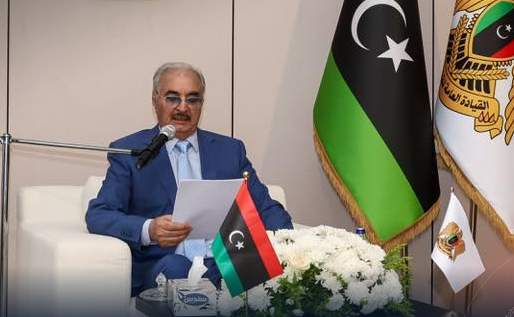The Commander-in-Chief of the Armed Forces, Field Marshal Khalifa Belqasim Haftar, welcomed the attendees from the tribes of southern Libya at “this blessed meeting,” saluting their national role in promoting social peace and their unlimited support for the Armed Forces and for the Dignity Revolution, “which defeated terrorism and eliminated extremism.” He affirmed, “and based on our commitment to ensuring the South receives the attention and support it deserves,” the launch of the “Together for the South” initiative and the dispatch of a delegation representing the General Command “to directly assess its needs and work to overcome any difficulties our people face there.”
Field Marshal Haftar stressed that the vision and goals of the Dignity Revolution “are not limited to defeating terrorism,” but extend to “broad horizons,” and “the first communiqué of the Battle of Dignity was the starting point” for them. He explained that “the souls of our martyrs and the blood of our wounded” were “the heavy price we paid for the nation to live with honor and for Libyans to live on their land as masters, with their heads held high in determination, pride, and dignity.”
The Commander-in-Chief said that the path “was never paved with roses,” and despite “all the mines planted in it and the barbed wire that surrounded it,” the Armed Forces managed “to come a long way in achieving security and stability,” and to embark on “the battle of building, reconstruction, and strengthening the spirit of patriotism and pride in belonging to this dear nation.”
After “this long journey of struggle,” Field Marshal Haftar noted that the country stands “at a pivotal point that requires us to make a decisive decision regarding the deadlocked political scene,” in order to continue the process of state-building, and this is “after we have given enough time to all local and international initiatives and efforts to address this escalating crisis, to no avail.”
He stressed that “the responsibility for making the decision to bring about radical change in the political scene,” which has caused severe harm to the nation and the citizen “to the point of affecting sovereignty and threatening the country’s unity and social cohesion,” falls “on the shoulders of all Libyans.” He added: “The time has come for the Libyan people to issue their decisive decision and clearly declare their position on all the intertwined and intersecting political paths,” based on their results and their impact on their way of life. They must “declare their readiness to endure more suffering and grant successive opportunities” to remedies “in the futile manner” that has been customary over the past years, and they must conduct “a comprehensive assessment of the country’s situation” and make their decision “for the launch of a new phase of serious national action” that addresses “all political and other crises” hindering state-building, “a new phase in which the people are the master and guardian of their own destiny.”
The Field Marshal explained that “the exclusion of the people from the path of self-determination and drawing the roadmap towards state-building” has led to “multiple transitional phases, identical in all their specifications and characteristics,” which has resulted in “the deadlock of the political scene and the halt of the wheel of progress.” Therefore, “the next phase must be advanced in its features and nature,” and distinguished by being “the product of a broad popular movement led and participated in by the vibrant national forces,” at the forefront of which are “our esteemed elders and wise men,” a movement that “includes all segments of society in all Libyan cities.” And “the people’s institutions, at all levels from the highest to the lowest,” have no choice but “to fully submit to what the people decide in this movement and to abandon any path that does not derive its legitimacy directly from the people.”
The Commander-in-Chief affirmed: “You will find your armed forces confronting anyone who stands against the people’s decision and choices.” He called on “the national forces throughout Libya” to “come together and unite their word and their ranks in a single line,” with the goal of “building a new Libya,” one that sheds “the robe of negativity, dependency, and stagnation,” and contributes “effectively to creating the new scene” which “paves the way for a phase of permanent stability” and in which “the one Libyan state is built on solid foundations where national sovereignty, the nation’s dignity, and its rights are preserved.”
The Field Marshal recalled that the social incubator was “the best support for the Battle of Dignity against terrorism,” and it offered its sons “to join its ranks” and supported the Armed Forces in “their national duty to defend the homeland and establish security.” And just as “the people depend on you to maintain social cohesion and on your commitment to ensuring reconciliation, tolerance, and harmony prevail,” today they look to “your role in actively contributing to an organized and serious national movement that addresses the political crisis from its roots and draws a roadmap stemming directly from the popular will,” one that “turns the page on previous stages, opens the doors to a prosperous future, and fulfills the aspirations of the Libyan people.” He concluded with a prayer: “May God grant you success, and peace be upon you, and God’s mercy and blessings.”
